Does hand clap really choose delicious watermelon?
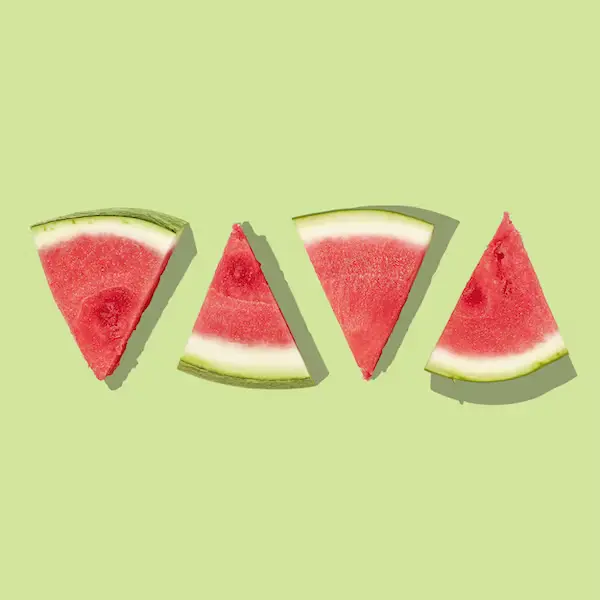
In a world where sellers compete to grab customers' attention and buy their products, you might think that clapping hands next to watermelons in the shop will make you choose the most delicious and quality watermelon. But is this claim really true? Can hand clap choose an already tasty watermelon? In this article, we will explore this claim and see if there are any scientific foundations for it.
Show key points
- The tradition of clapping hands next to watermelons is rooted in ancient beliefs and cultural customs that were thought to invite good luck or encourage fruit freshness.
- Many people mistakenly rely on external appearances like color and shine, but these aren't reliable indicators of a watermelon’s ripeness or taste.
- Leading agricultural experts confirm that there is no scientific evidence supporting hand clapping as a valid method for selecting quality watermelons.
- ADVERTISEMENT
- More effective techniques for choosing ripe watermelons include checking for a firm rind, uniform texture, and a deep, hollow sound when tapped.
- Studies have not substantiated the validity of using hand clapping to determine watermelon quality, reinforcing the need to use proven selection methods.
- Despite being a fun cultural practice, clapping hands should not replace evidence-based approaches when buying watermelons at the market.
- Beyond taste, watermelons offer numerous health benefits such as hydration, antioxidants, fiber, and essential nutrients like vitamins A and C.
1. The origin of the claim: where did the idea that clapping the hand chooses delicious watermelon come from?
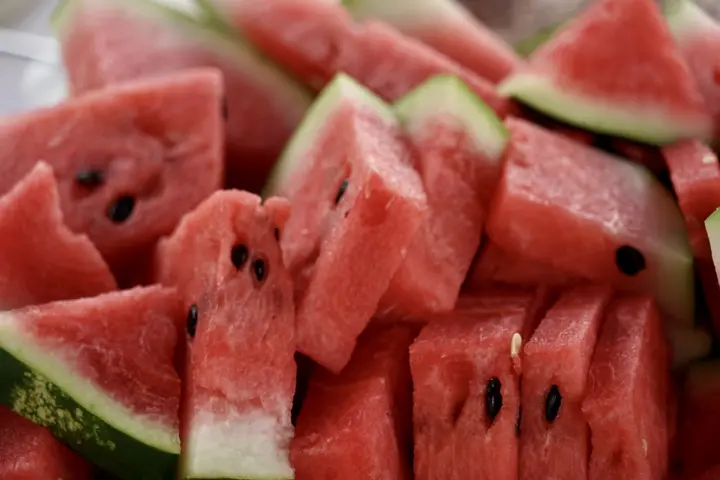
When you tour the fruit and vegetable markets, you may notice some customers standing next to the watermelon strain and turning to other shoppers before they start clapping their hands. The idea behind this seems to be that clapping hands brings good luck and chooses the best delicious watermelon. But where did this strange idea come from? Is there an origin for it?
Recommend
The origin of this claim goes back to ancient traditions that some people believe wrestle demons and believe in supernatural things. Some recount that in the past people believed that clapping hands could emit positive energy and encourage watermelon to become tasty and juicy. These beliefs may be ancient and have cultural or religious origins, as people seek good harvests with applause and supplication.
Over time, this idea passed from popular dogmas to stories spread across generations. With the advancement of social media and social media, the habit has spread more widely and many people routinely practice it when they buy watermelons.
In the end, it is a personal belief based on cultural heritage and popular custom. If you enjoy clapping hands when you buy watermelon, this is beautiful and can add some joy and fun to your shopping experience. But when choosing a delicious watermelon, you should rely on scientific rules and look at such signs of maturity and quality as color, aroma and texture.
2. Factors affecting the choice of watermelon: can quality be deduced from external appearances?
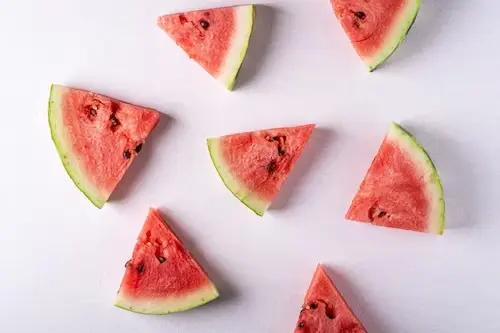
It is said that clapping the hand next to the watermelon can choose a watermelon that is distinguished by quality and deliciousness. But can it really be relied upon on external appearances to determine the quality of watermelons? Can quality be deduced from external manifestations? Let's explore this topic in more detail.
When preliminarily determining watermelons, many may rely on external appearances to determine their quality and ripeness. Only they look at the color, size, shape and scars on the surface of the shell. Some believe that watermelons with a glossy outer skin and dark color are preferable. In theory, some believe that a heavy and hard crust is a sign of watermelon ripeness and quality. But are these external manifestations really the determining factors of quality?
The fact that what needs to be known is that the external manifestations of watermelon are not conclusive evidence of its internal quality. A large, shiny watermelon may be beautiful to look at, but that doesn't necessarily mean it's delicious and ripe. These external factors may be just marketing influences aimed at attracting the attention of customers and their desire to buy watermelons.
In fact, a ripe and tasty watermelon can have a completely different look. It may have a matte crust or some small scars. They may have a different color and smaller size, but that doesn't mean they will be less delicious.
Thus, it can be said that relying on external appearances does not give us a complete picture of the quality of the watermelon we choose. It's best to rely on other techniques such as checking the skin by clicking on it to determine the watermelon's doneness, or gently testing the texture with your thumb to make sure it's tender and ripe.
3. What experts say: Are there studies that support the idea of clapping the hand to choose the best watermelon?
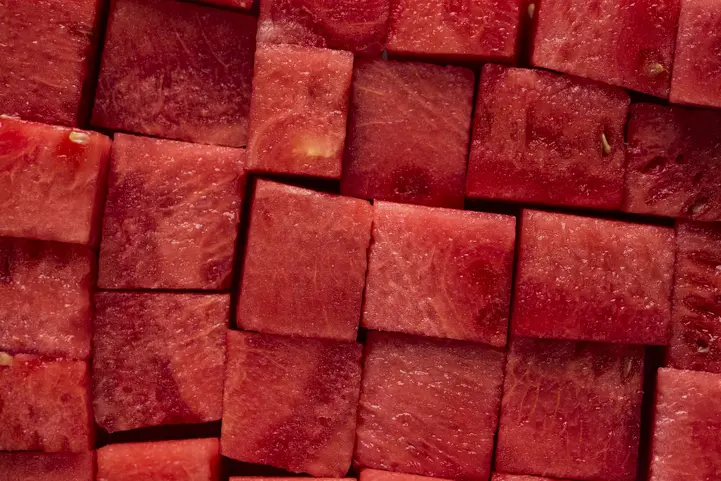
One renowned expert in agriculture and crops, Dr. John Smith, questions the validity of the idea of clapping the hand as an indicator of choosing the best watermelon. According to him, there is no conclusive scientific evidence to support this claim. Watermelon is one of the fruits whose quality and ripeness are difficult to determine only by looking at it from the outside.
Dr. Michael Jones, an expert in horticulture and agriculture, stresses that hand claps cannot be an accurate indicator of the quality of watermelons. He stresses that it is better to use other methods such as checking the skin, texture and sound to determine the quality of watermelon. It indicates that the shell should be close to the abdomen and free of spots or cracks. In addition, watermelons should be reasonably heavy, and should have a community voice after being appreciated.
On the other hand, there is a long-standing belief that clicking on a watermelon can be a good indicator of its maturity and quality. But is there any evidence for this claim? Dr. Jennifer Smart, an expert in food science, says the idea of clicking is not an accurate method. They suggest that the clicking sound can vary from watermelon to watermelon based on the different amounts of water and air that the watermelon contains. So, she recommends using other methods to identify delicious watermelons.
In short, it can be argued that despite the strength of popular belief about clapping the hand to choose the best watermelon, there is no scientific evidence to support this claim. Instead, it is preferable to rely on other methods such as checking the skin, texture and sound to determine the quality of the watermelon. Ultimately, there is no substitute for trying and testing watermelon yourself when you're in the store to ensure you choose the delicious and good watermelon to eat.
4. Other methods to check the maturity of watermelons: are there better ways to choose delicious watermelons?
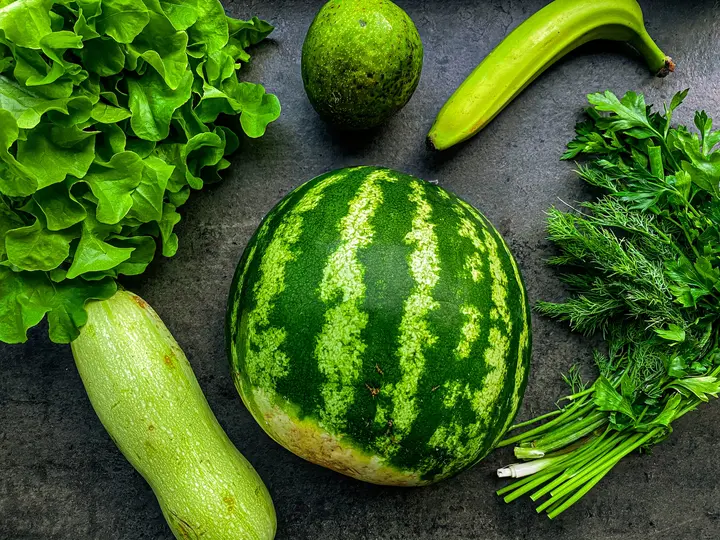
In a world where people are increasingly interested in healthy nutrition and healthy food choices, choosing delicious and ripe watermelons is important for many people. Although some people think that clapping the hand may be a way to choose a good watermelon, there are others that are better at achieving it. So what are those methods that are better to use to choose tasty and ripe watermelons?
One of the methods adopted to check the maturity of watermelons is to check the peel. When pressing on the outer skin of a watermelon, the watermelon rind should be slightly durable and give slight resistance. If the rind is too soft or gives no resistance, the watermelon may be underripe.
Besides checking the skin, the outside texture of the watermelon can also be checked. When touching watermelon, it should be smooth and uniform, without any hard areas or gaps. If there are any cavities or hard areas, the watermelon may be unripe or have other diseases.
One of the most common ways to correctly choose watermelons is to check the sound generated by pumpkins on watermelons. When you knock on a ripe watermelon, you should have a full, heavy sound. If the sound is empty or too loud, the watermelon may be unripe.
In addition, the adjacent peel section of the cuttings on the watermelon head can be examined. The shell of this part should be hard and there should not be any extraneous signs or shedding of the shell. If you see any signs of skin or peeling fall, the watermelon may be unripe.
Certainly, these other methods of checking watermelons may be more reliable than hand clap and more able to correctly determine the quality and maturity of watermelons. Therefore, people looking for delicious watermelons should pay attention to these best methods for choosing ripe watermelons that are suitable for their needs and nutritional needs.
5. Experimental group: Has anyone done a scientific study to find out how true the idea of clapping hands to choose delicious watermelon is?
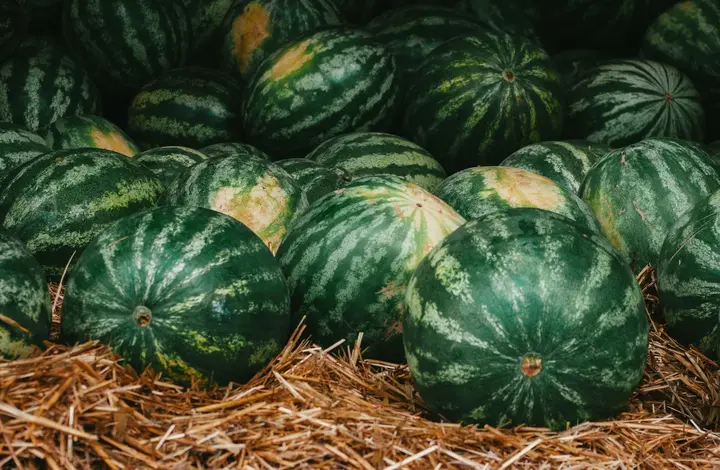
Having learned to choose watermelon, we must also understand the nutrients rich in watermelon
1. High in water and low in calories: Watermelon is a suitable piece of fruit to keep the body hydrated thanks to its high water content. Watermelon is also low in calories, making it an ideal choice for those trying to lose weight.
2. Natural source of vitamins and minerals: Watermelon contains a wide range of important vitamins and minerals such as vitamin C, vitamin A, potassium and magnesium. Consuming these nutrients promotes heart health, immune system and eye health.
3. Powerful antioxidants: Watermelon contains antioxidants that contribute to fighting cellular damage and protecting against heart disease and some types of cancer. Antioxidants also help delay the aging process and keep the skin young.
4. Strengthen digestion and improve gut health: Watermelon is high in dietary fiber that promotes digestion and improves gut health. It also helps prevent constipation and promote smooth bowel movements.
5. Reduce blood pressure: Watermelon contains a compound known as "citrulline" that helps expand blood vessels and improve blood flow. This, in turn, lowers blood pressure and reduces the risk of heart disease and strokes.
Given these amazing health benefits, it can be said with confidence that watermelon deserves a place in your healthy diet. Enjoy it as a refreshing snack or add it to salads and fruit herbs to boost its nutritional value. Do not miss the opportunity to enjoy the benefits of this delicious and refreshing fruit that promotes your overall health.

Although this claim is widespread in popular circles, there is no conclusive scientific evidence to support the idea that clapping the hand can reliably choose a delicious watermelon. The circumstances surrounding the watermelon and its external manifestations may be just influencing factors but do not necessarily reflect its actual ripeness or quality. Therefore, it is best to rely on other methods such as checking the skin, texture and sound when choosing a delicious watermelon. Do not believe everything that is said and always remember that quality cannot be determined by clapping the hand alone.








